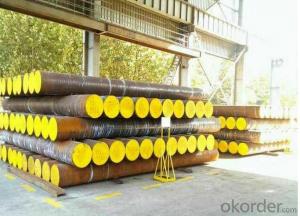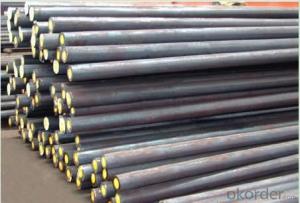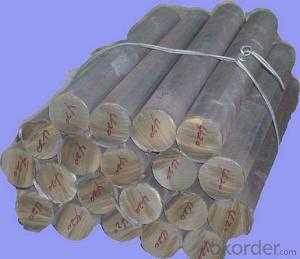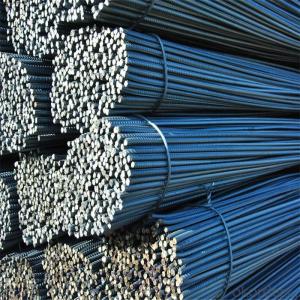SCM440 Alloy Steel Bar Hot-Rolled Bar
- Loading Port:
- Tianjin
- Payment Terms:
- TT OR LC
- Min Order Qty:
- 25 m.t.
- Supply Capability:
- 500000 m.t./month
OKorder Service Pledge
OKorder Financial Service
You Might Also Like
Specification
SCM440 Alloy Steel Bar Hot-Rolled Bar
Product Description:
1. Commodity: Round steel bar
3. Technical: Hot rolling
2. Length: Min. 5.8meter, according to requirement.
3. Diameter: 16mm-250mm
5. Packing: In Bundle or according to your requirements.
4. Standard: GB/T 3077-1999(42CrMo) ; JIS SCM440; DIN 42CrMo4 ; ASTM 4140 ; BS 708M40
Chemical Composition(%):
C | Si | Mn | Cr | Mo | Ni | P | S |
0.38-0.45 | 0.17-0.37 | 0.50-0.80 | 0.90-1.20 | 0.15-0.25 | ≤0.030 | ≤0.030 | ≤0.030 |
Standard:
GB | AISI | DIN | JIS | ISO |
42CrMo | 4140 | 42CrMo4 | SCM440 | 42CrMo4 |
Available Size:
Rolled round bar | φ20-120mm × L |
Forged round bar | φ130-195mm × L |
Application:used for various large-size or medium-size precision plastic mould and low melting
point alloy parts
The steel with high strength and toughness, hardenability is better also | |||||||
After conditioning treatment quenching deformation of small | |||||||
high fatigue limit and repeated impact resistance |
Quality Certificate:we can supply quality certificate
Packaging:standard seaworthy packing or as customer require
Delivery: In 7-10 days after we receive 30% deposite
Product show:
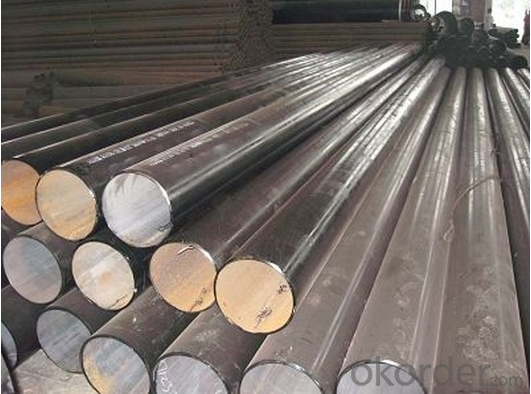
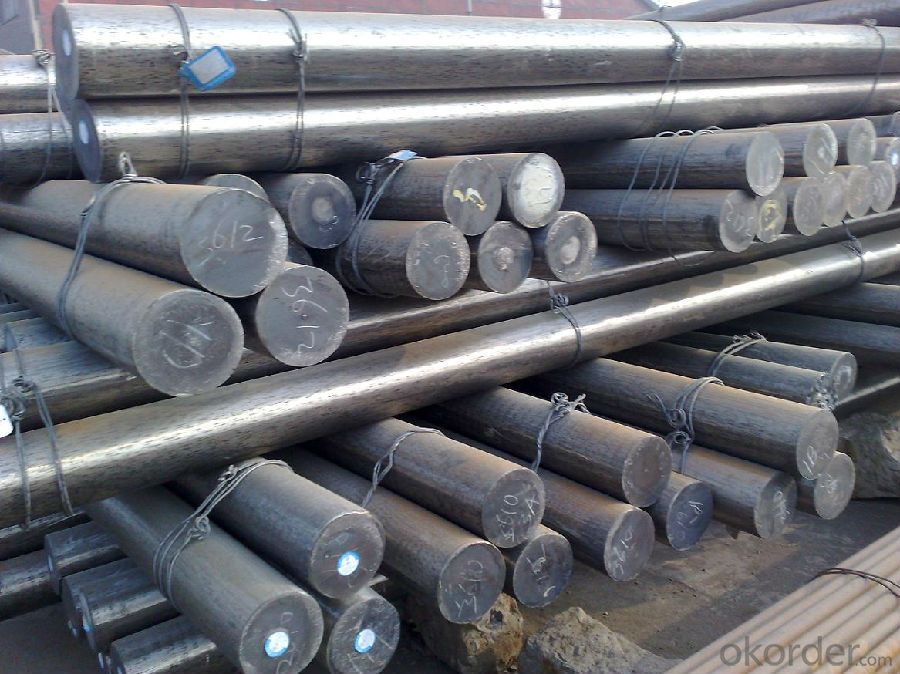
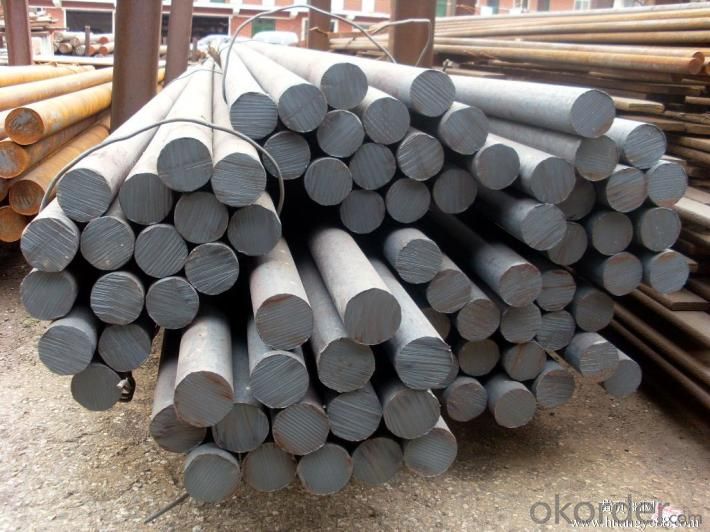
- Q:What are the different types of electrical steel?
- There are several types of electrical steel, including grain-oriented electrical steel (GOES), non-grain-oriented electrical steel (NGOES), and silicon steel.
- Q:How is ultra-high-strength alloy steel used in the aerospace industry?
- Ultra-high-strength alloy steel is extensively used in the aerospace industry due to its exceptional strength-to-weight ratio. It is commonly employed in the manufacturing of aircraft components such as landing gear, engine mounts, and structural parts. This steel's remarkable strength helps enhance the overall structural integrity of aircraft, ensuring they can withstand extreme conditions and stresses encountered during flight. Additionally, its lightweight nature contributes to reducing the weight of the aircraft, which in turn improves fuel efficiency and increases payload capacity.
- Q:What are the different wear-resistant grades of special steel?
- There are several different wear-resistant grades of special steel, including but not limited to, AR400, AR500, AR600, Hardox 400, Hardox 450, Hardox 500, Hardox 600, Bisplate 400, Bisplate 450, Bisplate 500, Bisplate 600, and Creusabro 4000. These grades are specifically designed to withstand abrasive wear and impact, making them ideal for applications in industries such as mining, construction, and manufacturing.
- Q:What are the requirements for special steel used in renewable energy equipment manufacturing?
- The requirements for special steel used in renewable energy equipment manufacturing are quite specific and unique compared to traditional steel used in other industries. Given the demanding nature of renewable energy equipment, the steel used must possess certain characteristics and properties to ensure optimal performance and durability. 1. Corrosion Resistance: Special steel used in renewable energy equipment must have excellent corrosion resistance to withstand exposure to harsh environmental conditions. This is particularly important for offshore wind turbines or solar panels installed in coastal areas with high salt content in the air. 2. High Strength and Toughness: The steel should have high strength and toughness to withstand mechanical stresses and loads. Renewable energy equipment, such as wind turbine towers or hydroelectric dams, experiences significant forces, including strong winds, water pressure, or vibrations. Steel with high strength can provide the necessary structural integrity to handle these forces. 3. Fatigue Resistance: Given the cyclic nature of renewable energy equipment, the steel must have excellent fatigue resistance. Wind turbines, for example, constantly experience alternating loads due to wind gusts and rotational forces. Special steel with fatigue resistance properties can prevent structural failures caused by repeated stress. 4. Weldability: Weldability is a crucial requirement for the steel used in renewable energy equipment manufacturing. Many components of renewable energy systems require welding, and the steel must be easily weldable without compromising its strength or other properties. 5. Environmental Sustainability: As renewable energy equipment is designed to promote sustainability, the steel used should align with this objective. Steel manufacturers are increasingly focusing on reducing the carbon footprint of their products by using recycled content or adopting greener production processes. 6. Cost-effectiveness: While meeting all the above requirements, special steel used in renewable energy equipment must also be cost-effective. The steel should provide the desired properties at a reasonable cost to ensure the competitiveness and viability of renewable energy projects. To meet these requirements, steel manufacturers often develop specific grades or alloys that cater to the needs of renewable energy equipment manufacturers. These grades are continuously evolving as the renewable energy industry advances, enabling the production of more efficient and durable equipment to support the transition to clean energy sources.
- Q:What are the environmental impacts of manufacturing special steel?
- Manufacturing special steel has significant environmental impacts due to its energy-intensive production process and the extraction of raw materials. The production of special steel requires high temperatures and uses large amounts of fossil fuel-based energy, resulting in substantial greenhouse gas emissions contributing to climate change. Additionally, the extraction of iron ore and other raw materials for steel production can lead to deforestation, habitat destruction, and water pollution. The disposal of steel waste and byproducts also poses challenges, as it can contaminate soil and water sources. Therefore, the environmental impacts of manufacturing special steel must be carefully managed and mitigated through sustainable practices and technologies.
- Q:What are the different corrosion testing methods used for special steel?
- There are several corrosion testing methods used for special steel, including salt spray testing, electrochemical testing, immersion testing, and accelerated corrosion testing. These methods help to assess the corrosion resistance and durability of special steel in different environments and conditions.
- Q:What are the different methods of improving the wear resistance of special steel?
- There are several methods that can be employed to improve the wear resistance of special steel. Firstly, heat treatment techniques such as quenching and tempering can be used. Quenching involves rapidly cooling the steel in a liquid medium, such as oil or water, to increase its hardness. This process forms a hardened surface layer that can resist wear. Tempering, on the other hand, involves reheating the quenched steel to a specific temperature and then cooling it slowly. This helps to reduce the brittleness caused by quenching and improve the steel's toughness, which is important for wear resistance. Another method is through alloying. Adding elements such as chromium, manganese, or vanadium to the steel can significantly enhance its wear resistance. These alloying elements form carbides, nitrides, or borides, which increase the hardness and improve the material's ability to resist wear and abrasion. Surface treatment techniques like carburizing or nitriding can also be employed. Carburizing involves introducing carbon into the steel's surface by heating it in a carbon-rich atmosphere. This forms a hardened surface layer with a high carbon content, making the steel more wear-resistant. Nitriding, on the other hand, involves diffusing nitrogen into the steel's surface, forming nitrides that increase hardness and wear resistance. Furthermore, physical vapor deposition (PVD) or chemical vapor deposition (CVD) coatings can be applied to the steel surface. PVD involves depositing a thin layer of wear-resistant material, such as titanium nitride or diamond-like carbon, onto the steel's surface using a vacuum process. CVD, on the other hand, involves depositing a wear-resistant coating by chemical reactions at elevated temperatures. These coatings provide an additional layer of protection against wear and friction. Lastly, the grain size of the steel can be controlled through processes like grain refinement or severe plastic deformation. Smaller grain sizes typically result in increased hardness and improved wear resistance. Overall, a combination of these methods can be used to enhance the wear resistance of special steel, depending on the specific application and desired properties.
- Q:What are the applications of special steel in the automotive supply chain?
- Special steel has various applications in the automotive supply chain. It is widely used in the manufacturing of engine components, such as crankshafts, camshafts, and connecting rods, due to its high strength and resistance to wear. Special steel also finds application in the production of suspension and steering components, as well as gears and shafts, which require excellent toughness and durability. Moreover, it is utilized in the fabrication of safety-related parts like seat belt anchors and airbag systems, ensuring the necessary strength and reliability. Overall, special steel plays a crucial role in enhancing performance, safety, and efficiency in the automotive industry.
- Q:How does special steel contribute to the power generation machinery industry?
- Special steel plays a crucial role in the power generation machinery industry by contributing to the efficiency, reliability, and durability of power generation equipment. Firstly, special steel possesses exceptional mechanical properties, such as high strength, toughness, and temperature resistance. These properties make it ideal for manufacturing key components of power generation machinery, such as turbines, generators, and boilers. The superior strength and toughness of special steel enable these components to withstand high pressures, extreme temperatures, and harsh operating conditions, ensuring the safe and efficient operation of power plants. Moreover, special steel alloys can be specifically designed to resist corrosion, erosion, and wear, which are common challenges faced by power generation equipment. Corrosion can be caused by the chemical reactions between metals and the environment, while erosion and wear result from the high-speed flow of steam, water, or gases. By utilizing corrosion-resistant and wear-resistant special steel, power generation machinery can operate for longer periods without significant degradation, reducing maintenance requirements and downtime. Another significant contribution of special steel to the power generation machinery industry is its ability to retain magnetic properties at elevated temperatures. This property is crucial for electrical generators, as it ensures optimal performance and efficiency. Special steel with excellent magnetic properties enables generators to produce electricity with minimal energy losses due to heat, resulting in higher power output and reduced energy consumption. Furthermore, the design flexibility of special steel allows for the production of customized components, tailored to the specific requirements of different power generation technologies. For instance, in nuclear power plants, special steel alloys with high resistance to radiation and neutron embrittlement are used for the construction of reactor pressure vessels and other critical components. In renewable energy systems like wind turbines, special steel with superior fatigue resistance is utilized to withstand the cyclic loading experienced by turbine blades. In summary, special steel significantly contributes to the power generation machinery industry by enhancing the efficiency, reliability, and durability of power generation equipment. Its exceptional mechanical properties, corrosion resistance, wear resistance, magnetic properties, and design flexibility make it indispensable for manufacturing components that can withstand extreme conditions and ensure the continuous and efficient generation of electricity.
- Q:What are the applications of special steel in the agriculture supply chain?
- Special steel has several applications in the agriculture supply chain. It is commonly used in the manufacturing of farm equipment and machinery such as tractors, plows, and harvesters. Special steel's high strength and durability make it ideal for these heavy-duty applications, ensuring that the equipment can withstand the demanding conditions of the agricultural sector. Additionally, special steel is also used in the production of storage tanks and silos, providing a robust and reliable solution for storing grains, fertilizers, and other agricultural products.
1. Manufacturer Overview |
|
|---|---|
| Location | |
| Year Established | |
| Annual Output Value | |
| Main Markets | |
| Company Certifications | |
2. Manufacturer Certificates |
|
|---|---|
| a) Certification Name | |
| Range | |
| Reference | |
| Validity Period | |
3. Manufacturer Capability |
|
|---|---|
| a)Trade Capacity | |
| Nearest Port | |
| Export Percentage | |
| No.of Employees in Trade Department | |
| Language Spoken: | |
| b)Factory Information | |
| Factory Size: | |
| No. of Production Lines | |
| Contract Manufacturing | |
| Product Price Range | |
Send your message to us
SCM440 Alloy Steel Bar Hot-Rolled Bar
- Loading Port:
- Tianjin
- Payment Terms:
- TT OR LC
- Min Order Qty:
- 25 m.t.
- Supply Capability:
- 500000 m.t./month
OKorder Service Pledge
OKorder Financial Service
Similar products
New products
Hot products
Hot Searches
Related keywords






